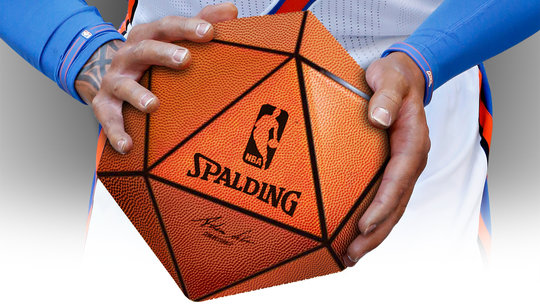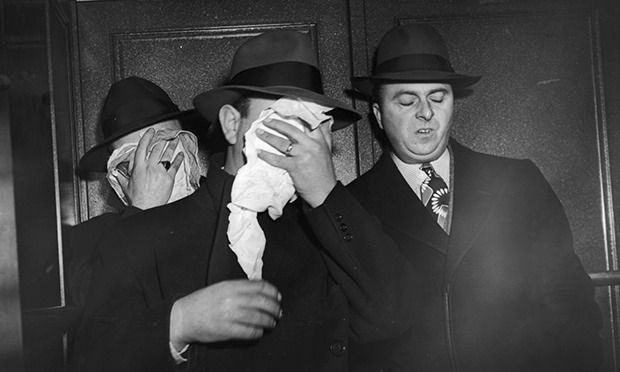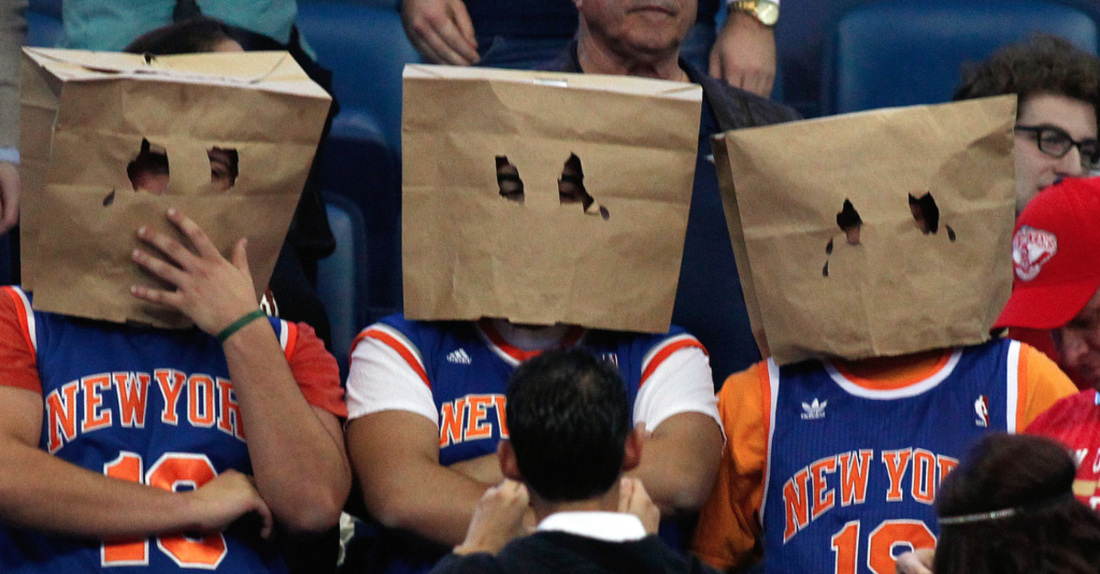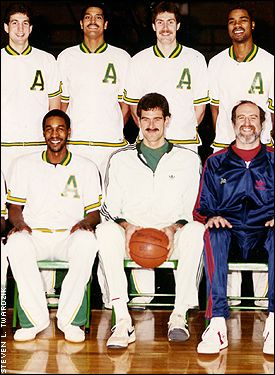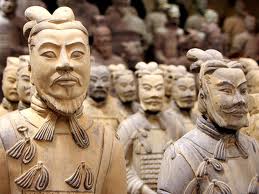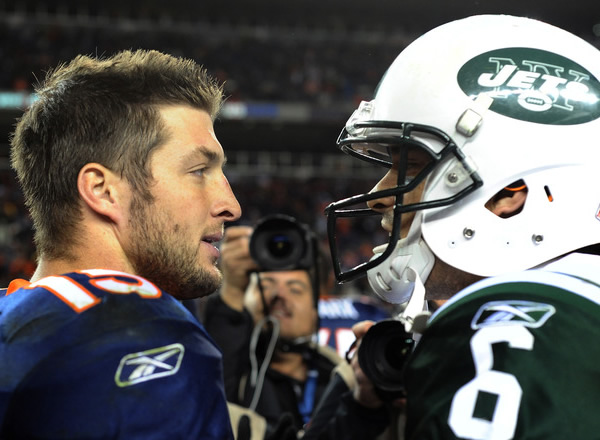|
Sometimes in sports, it is possible to over-think.
We saw that in the Super Bowl when the Seahawks coaches decided to “waste” a down by putting the ball in the air at the goal line. Some waste. New Yorkers are watching an entire basketball season get wasted as the Knicks stumble around the court, consulting copies of a textbook titled “Triangle Offense.” The flawed reasoning is clear in Harvey Araton’s fascinating luncheon interview with Phil Jackson in Wednesday’s Times – too old New York hands talking hoops. What I take away from the candid conversation is that even very smart and successful people like Jackson can over-think. I am reminded of that in the computer age,when people belatedly employ statistical analysis to what athletes and coaches did on the field, on the fly. Two examples: The 2014 World Series ended with the tying run on third base for Kansas City. Many hours afterward, the great Nate Silver – who aced the 2012 presidential election –wrote that the runner should have been sent home as the ball was kicked around in left field. Silver came up with statistics that the tying run scores from third with two outs only 25-27 percent of the time. Silver suggested that the Royals were not likely to get another hit off Madison Bumgarner and postulated that a collision at home plate would have favored the Royals because of rule changes since Buster Posey of the Giants had his leg broken in a collision in 2011. I found that specious over-thinking because Posey remains a tough and resourceful catcher. Having seen the play as it happened, on television, and in many replays, I go along with the decision by the Royals’ third-base coach – Mike Jirschele, a baseball lifer – as he lined up the wayward ball, the butterfingered Giants fielders, and the hitter, Alex Gordon, as he steamed toward third. This was a decision on the fly that journalists and numbers crunchers will never have to make. If the coach had tried to remember the statistical probabilities of tying runs on third base, the process would have interfered with his complicated spot decision. After a lifetime of covering sports, up close, talking to managers and coaches, I have great respect for what they know and do, in real time. Not that mistakes don’t happen. We saw one in the Super Bowl, when the very smart Pete Carroll and his offensive coordinator called a pass from half a yard outside the end zone. A day later, I read an “analysis” in the Times that said in football, as in life itself, people have to employ a “mixed strategy” or else they become too predictable. I agree, in theory, but I say that second-and-goal, maybe 18 inches away, is not the time to get cute and put the ball in the air, where a defensive back, having the greatest moment of his career, maybe his life, can go get it. Somewhere in the Football Handbook of Statistical Probability, there is a rule: Give the Ball to the Big Fella. That’s not statistics, a day later. That is common sense, for playing the game in the moment. Your thoughts? A former college basketball star I know sees way too much of the New York Knicks and Philadelphia 76ers.
An intense player and demanding coach once upon a time, my friend has the distinct feeling he is observing a crime being committed. We both knew players, decades ago, who dumped games, shaved points, to satisfy gamblers on one side of the point spread. Some (not all, I suspect) got caught. Many had their lives ruined; a few went to jail. That is not the problem with the 76ers and Knicks, whose cumulative record was a ghastly 10 victories and 63 losses, as of Friday morning. The players are doing their earnest best to win but the owners are doing their dishonest best to keep the talent level down, in order to choose a top star in next spring’s college draft. It enrages my competitive friend to see teams in the National Basketball Association skimping on salaries. He calls me and rails: What is the ethical difference between NBA teams ironically dumping games in plain sight by “virtue” of dumping salaries and the old point shaving by players? My outraged hoopster friend asks if some of the executives’ activities are not some kind of crime, or at least a significant breach of competitive integrity? Why do the NBA poobahs allow such a public breach of faith with its fan base, the ultimate victims. Are the poobahs’ eyes shut to this “gaming of the system?” I wonder if there is not some eager prosecuting attorney out there who could investigate the business tactic of tanking an entire season. And what about the wealthy patrons who pay outrageous prices for seats and so-called food in Madison Square Garden? These folks did not accumulate their riches by being pushovers in their business lives. Is there not a potential class-action suit festering among the expensive suits at courtside? Adam Silver, the still-new commissioner of the NBA, may be preoccupied by his announced goal of allowing gambling on his sport. Gambling used to be considered a vice. Now it is a way of raising money because people don’t like paying taxes for roads and bridges. Meanwhile, Silver has part of his league playing with inferior rosters in an attempt to reload, cover up past personnel mistakes, and take advantage of a system that is anti-competitive. My friend used to dive for loose balls and rage against indifference. Now he sits in front of the tube and watches the Knicks and 76ers stagger around, according to the schemes of their ownerships. I know of a former college player who got caught taking a few dollars to shave a few games. He’s never re-connected with teammates who would love to see him. He lives a clean life, after what he did. But the owners of NBA clubs sit in the front row and smirk. Shouldn’t there be laws against owners blatantly trying not to win? Whether it’s the owners or the players, dumping a game or a season emits the same foul odor. Don’t give up.
Don’t despair. This is the lesson of Phil Jackson, who now returns to rescue the Knicks, indeed, rescue New York. I remember the night – the late night – in February of 1985, in a Mexican joint in Florida, when he lamented that he was done, finished, in the National Basketball Association. I’m a bit older than Jackson, can remember him coming along in the late Sixties, a thoroughly likable counter-culture guy from the Upper Midwest, who went with Bill Bradley to Allard Lowenstein anti-war rallies. The Knicks had virtually a whole team of cool guys. It was a great time to be around them, and not just because they eventually won two championships. However, by 1985, Jackson had convinced himself that he would never work in the N.B.A. again. His playing career was over, and he and Charles Rosen had written his book called, “Maverick: More Than a Game,” that revealed just where Jackson’s shaggy head was at – perhaps not a good idea in the N.B.A. job market. I was in spring training with the Mets in funky old St. Petersburg, and Jackson and his Woodstock buddy Rosen – once the star at Hunter College -- were coaching the Albany Patroons of the Continental Basketball Association, a league of bizarre travel connections to places as distant as Puerto Rico and Oshkosh, Wis. We went out for pizza after a game, along with Herbie Brown, who had coached the Israel Sabras, Detroit Pistons and Tucson Gunners, and they were telling horror stories about overnight drives and changes-in-Atlanta. Phil Jackson was morose. It was late at night, and he was morose. He was done. Cooked. His modest revelations into life style and politics had revealed himself to be a liberal, perhaps a troublemaker by Reagan-era standards. The N.B.A. was flush, with Erving and Kareem going out, Bird and Magic and Jordan in their prime. In Jackson’s fevered mind, there was no room for a perceived hippie. My role was to order the food and the beer and scribble down travel tales while his colleagues tried to talk Jackson off the conversational ledge. Have another nacho, Phil. Change planes in Atlanta a few more times. See what happens. It’s just a box of rain. I don’t believe anybody said that, but you never know. Next time I saw Jackson was in the Garden. He was an assistant coach with the Bulls, wearing a suit and a surprised look. The thing I remember most about his Jordan years was that he loved annoying Pat Riley and all the other Knick coaches and suits, but he moderated his antagonism out of respect to Red Holzman, his coaching godfather who was always at the games. Now Jackson has won 11 championships, not bad for a perceived anarchist. He has enough stature to force James L. Dolan to downgrade the absolute weakest link of the New York Knicks franchise, that is to say, James L. Dolan himself. The hippie as corporate savior. I wonder if Phil remembers that night in the Mexican joint. * * * My travel column from 1985: http://www.nytimes.com/1985/02/21/sports/sports-of-the-times-on-the-road-to-oshkosh-again.html I caught up with Charley Rosen in 1997, by which time he and Phil were pursuing separate muses: http://www.nytimes.com/1997/04/11/sports/novelist-and-a-coach-are-still-hanging-out.html Filip Bondy on Jackson the other day: http://www.nydailynews.com/sports/basketball/knicks/bondy-yipee-hippie-garden-exec-phil-long-bohemian-roots-article-1.1723057 In New York we have multiples of everything – exquisite Indian restaurants or places where the roti is as heavy as a discus. The same applies to our sports teams – eight of them overlapping in the early spring. The Devils vanished early, the Nets could not sustain; and the Islanders taught their doomed constituency to care again. The Red Bulls are in first place under my man Mike Petke. The Rangers won a seventh game on the road. And the Yankees are doing amazingly with replacements, showing that Brian Cashman is indeed a dandy general manager when he is not rappelling or sky-diving. Or maybe because he does. That brings us to the Mets, who are reaching the nether level that was preordained once the budget was shrunk. The Mets are squabbling over the temper tantrums of Jordany Valdespin. Rick Ankiel as the great center-field hope -- the ball clanking off his borrowed glove? Oy. Then there are the Knicks, who managed to win a playoff series against Boston, but are the dysfunctional playoff team they always were going to become. The great Harvey Araton – once labeled The Rebbe of Roundball – dissects the imperfections of Carmelo Anthony in the Wednesday New York Times. http://www.nytimes.com/2013/05/15/sports/basketball/knicks-one-man-play-still-needs-stage-hands.html?ref=sports&_r=0 Anthony is a point machine, which is fine for the regular season, when every night is Garbage Time. But he is not a player for pollen season, when defenses tighten up, when the Hibberts of the world assert themselves. Anthony is the softest superstar you will ever see. The Knicks brain trust surrounded him with ancient guardians with the mobility of the Xi’an terracotta warriors. I could have sworn I spotted Wally Osterkorn, Bob Brannum and Al McGuire from the old elbow-wielding days of the N.B.A. But none of the imported tough guys could give Anthony the imagination of a true superstar. Can I drop a name on you? I know Jeremy Lin did not have a great playoff round with Houston, but I still have the memory of him penetrating defenses and finding the open man in his wonderful Linsanity flurry a year ago. He made his teammates better – even Steve Novak – but Anthony demanded the ball early and often. This was always going to happen once the Knick ownership broke up a very decent developing team two years ago, to bring in Anthony for a sugar rush of points. Now the Xi’an warriors are calcified; Anthony and J.R. Smith keep chucking away. It is mid-May and they are exposed. This was always going to happen in the playoffs. But it could be worse. The Knicks could be the Mets. “What do you think?”
Nice people who remember when I used to emit instant profundity three times a week for the Times have inquired about some of the sports issues of the day. Since you asked: 1. Tebow. I cannot imagine a Jets fan, a sports fan, or just a voyeur of the human condition, who would not be fascinated by the Jets’ acquisition of Tim Tebow. Seems to me, the Jets and Mark Sanchez deteriorated last season. The charm is off the alleged leadership and ability of Sanchez and, for that matter, Rex Ryan. So what’s to lose? Tebow, who was scheduled for a press conference in Jet-land Monday at noon, seems to be a secure athlete with a history of success. If he cannot throw well enough to be a standard N.F.L. quarterback, he certainly seems to have the skills of a scrambler, which to my point of view is great fun to watch. He gets to the end zone. Isn’t that the point? Did he wear out defenses in the thin air of Denver? Maybe. But if he adds a dimension to the Jets, that makes them more dangerous, right? It’s a shame that great athletes of past decades (that is to say, black quarterbacks) never got to display their gifts starting with the snap from center. That seems to be a battle that the Cunninghams and Vicks have won, and continue to win. Tebow profits from their journey. Plus, quarterback controversies are usually fun. Coaches will blather that their chosen quarterback is doing great, but in these informed times fans have the facts and the electronic forum to ask, nay demand, a second opinion, another look. Joe Namath thinks it's a travesty. He's Broadway Joe. He won a Super Bowl. He will always be entitled to his opinion. From afar, Tebow strikes me as a solid adult who can handle just about anything, including marginality as a backup quarterback with other duties. Tebow’s religion should not be an issue. He witnesses his Christian faith, and seems to be an energetic, positive member of the gang, like Mariano Rivera, whose word and behavior are gold in the Yankee clubhouse, or R.A. Dickey, who is usually in the center of the Mets’ dugout when he is not pitching. One final thought from this soccer-centric observer: I love versatility in sports. In most of the world, soccer players are called footballers; they move around, expected to defend, tackle, run, pass, even score. I use that word for the rare American college or pro player who can handle multiple roles – running backs who can throw, receivers who can play a little defensive back, linebackers who can catch a pass as an eligible receiver. Tim Tebow is a footballer. Let the fun begin. 2. The Bounty. The suspensions handed out by N.F.L. commissioner Roger Goodell constitute his finest hour. He stood up for every fan, every player and every parent who allows a child to play this game with some underlying hope for safety and respect for the rules. By banning New Orleans coach Sean Payton for a year, Goodell showed an awareness that the Saints violated the core of their sport – they cheated on the paramount issue of safety. What they did, in permitting cash bounties for taking quarterbacks and other key players out of the game, was worse than cheating with performance-enhancing drugs. The rules against drugs in sports are to insure a level playing field and also to mandate long-range health for players at all levels, including youths who emulate professionals. The cash bounties were a direct assault on the safety and future of opponents. They amounted to premeditated violence – a huge distinction under the law. From my angle, Goodell could have banned Payton for life. Payton and his assistants allowed players to maim or possibly even kill somebody for a few thousand bucks. A year away catches everybody’s attention. It was vital that Goodell act because the N.F.L. is so huge in attendance, television viewership, endorsements and, yes, illegal gambling. Part of Goodell’s constituency fills out forms every week, picking winners and judging the point spreads. He cannot afford to acknowledge this, but it is true. Everybody deserves to know there is not a game within a game – cripple the quarterback, for dollars. The suspensions were also vital because of the self-important role taken on by college and professional football. Coaches and other officials carry themselves with the smug self-assurance that the great American sport of foo’ball upholds some deep national moral and ethical code. I hope it doesn’t. But if that industry is going to assume this role then it has to be clean. Goodell was handed a grievous violation at the core of his business. And he acted. Bully for him. 3. The Knicks. Even when the Knicks went on a winning streak after the resignation of Mike D’Antoni, some Knicks fans were not charmed because they felt Carmelo Anthony would ultimately hold the team back by his talented obtuseness. After all, the Knicks had nice teamwork going last season and a 28-26 record before owner Jim Dolan insisted on trading four players to get Anthony. The next version of the Knicks went 14-14 and lost four straight to the Celtics in the playoffs. This year the Knicks were ragged until Jeremy Lin appeared from nowhere to get everybody playing together. Then Anthony came back from his injury and the teamwork vanished. Lin was not a superstar suddenly discovered but more likely a symptom of what happens when skilled players work together. The New York fans saw team basketball return to the Garden, but Anthony’s self-centeredness cost D’Antoni his job. Anthony may have just enough individual skill, and Mike Woodson seems to be a professional coach, for the Knicks to slip into the playoffs, however briefly. However, the fun of watching the ball zip around the court during the Jeremy Lin era may not be possible. Carmelo Anthony is now in the position of wrecking teamwork in a basketball-savvy city two years in a row. Is that some sort of N.B.A. record? Anyway, that’s what I think. Thanks for asking. Your comments are valued. GV |
Categories
All
|
